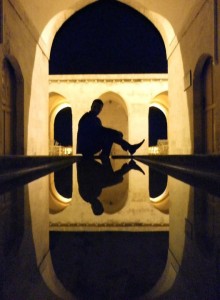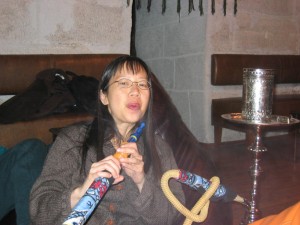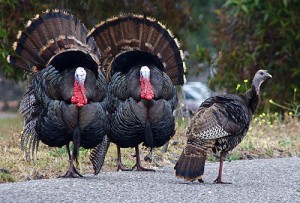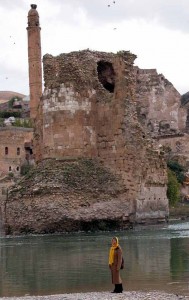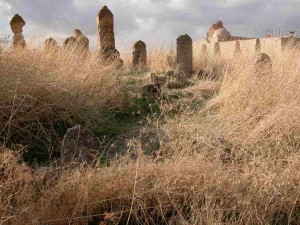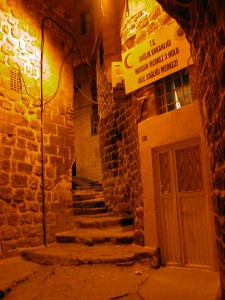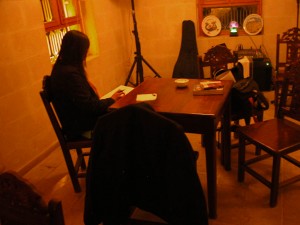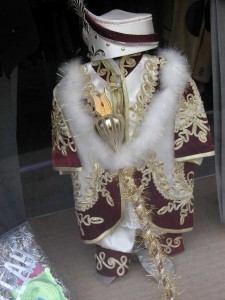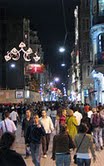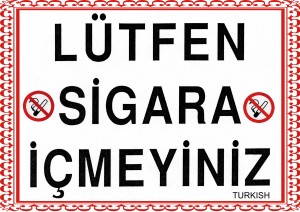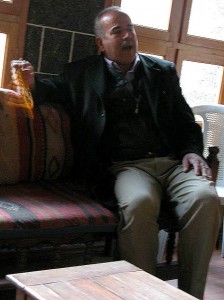 Daylight was quickly fading at 3:30 in the afternoon. I hurried, trying to catch up with Dore and Musefa, a Kurd we met at the courtyard of the famous Olu Camii Mosque in Diyarbakır. When we told Musefa we wanted to go to the Dengbej house, he gladly took the lead.
Daylight was quickly fading at 3:30 in the afternoon. I hurried, trying to catch up with Dore and Musefa, a Kurd we met at the courtyard of the famous Olu Camii Mosque in Diyarbakır. When we told Musefa we wanted to go to the Dengbej house, he gladly took the lead.
“We have to be quick.” Musefa kept looking at his watch. “The Dengbejs have been singing since morning and they may not stay at the house for very long.” We trod down one alley after another, cobble-stoned streets and high walls on both sides . Soon I lost sight of the men’s back. A young woman appeared beside me. “Dengbej?” She smiled. I nodded. She walked with me to the next corner and pointed to her left.
The Dengbej house was a traditional building with a courtyard. A few old men were leaving as we entered. Musefa spoke to them and they greeted us with a dignified nod, and walked back with us into a room lined with chairs. The Dengbejs sat down. One began to sing.
He was telling a story in verse. Along with his recitative, his high tenor voice often dwelled on a pulsated note, and each verse ended with an abrupt sigh. He was Pavarotti in a command performance. In his hand was a string of prayer beads he fingered as he sang. When he finished he shook our hands and left.
Another old man began to sing. His voice was low and husky and his pulsating notes were more tremulous. As he sang there was a twinkle in his eye and his facial expressions were that of ironic resignation. I found myself laughing despite the fact that I didn’t understand a word. Musefa later explained that it was a story of unrequited love.
After the performances we went outside. A few of the Dengbejs were still hanging out at the courtyard. One of them came up to me.
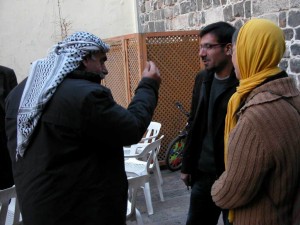 “Chine?”
“Chine?”
“Evet.”
He started talking to Musefa excitedly. I heard the word “helicopter” several times. When he finished he wanted Musefa to translate.
“He said the English word “helicopter” came from the Kurdish language. “Heli” is bird…”
Their oral tradition has few to pass on. The Dengbejs come together daily to pass time, singing to each other. They will carry their music to their graves. But perhaps the Dengbejs will ride a helicopter to heaven, where all the angels may gather for a feast of song-story.
Photos by Dore Steinberg
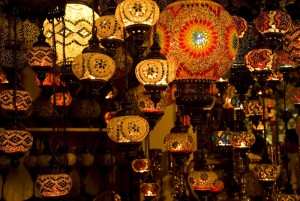 The magic of light encased, hanging down from the ceiling, or swinging on a long stick, flickering. The glimmer inside a paper fish’s belly, yellow star fruit, hairy rambutan. When I was small I pulled a little white curly crepe rabbit with four wooden wheels. A candle was lit inside, held by a thin wire. My sister and I walked up and down the length of the short corridor at home. She with a butterfly of transparent wings. We were the keepers of light, short legs toddling, gleeful and drooling, a kind of mythical youngling along with the shadows that cast on the walls and ceiling.
The magic of light encased, hanging down from the ceiling, or swinging on a long stick, flickering. The glimmer inside a paper fish’s belly, yellow star fruit, hairy rambutan. When I was small I pulled a little white curly crepe rabbit with four wooden wheels. A candle was lit inside, held by a thin wire. My sister and I walked up and down the length of the short corridor at home. She with a butterfly of transparent wings. We were the keepers of light, short legs toddling, gleeful and drooling, a kind of mythical youngling along with the shadows that cast on the walls and ceiling.
